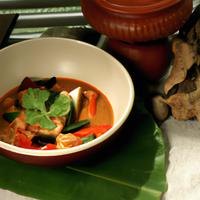
1 serving (250 grams) contains 200 calories, 5.0 grams of protein, 10.0 grams of fat, and 25.0 grams of carbohydrates.

Log this food in SnapCalorie

Nutrition Information
Calories |
188.7 | ||
|---|---|---|---|
% Daily Value* |
|||
| Total Fat | 9.4 g | 12% | |
| Saturated Fat | 5.7 g | 28% | |
| Polyunsaturated Fat | 0 g | ||
| Cholesterol | 0 mg | 0% | |
| Sodium | 566.0 mg | 24% | |
| Total Carbohydrates | 23.6 g | 8% | |
| Dietary Fiber | 3.8 g | 13% | |
| Sugars | 5.7 g | ||
| protein | 4.7 g | 9% | |
| Vitamin D | 0 mcg | 0% | |
| Calcium | 47.2 mg | 3% | |
| Iron | 1.9 mg | 10% | |
| Potassium | 377.4 mg | 8% | |
* Percent Daily Values are based on a 2,000 calorie diet. Your daily values may be higher or lower depending on your calorie needs.
Food Attributes
Source of Calories
About Thai vegetable curry
Thai Vegetable Curry is a flavorful dish rooted in traditional Thai cuisine, celebrated for its aromatic spices and vibrant ingredients. Typically crafted with a delicate balance of coconut milk, curry paste, and a medley of fresh vegetables such as bell peppers, carrots, zucchini, and broccoli, this dish showcases the region’s mastery of bold yet harmonious flavors. Thai basil, lime leaves, and lemongrass often add layers of fragrance and depth. Health-wise, Thai Vegetable Curry is rich in essential nutrients thanks to its veggie-packed profile, offering vitamins, fiber, and antioxidants. Coconut milk provides healthy fats, but it can also be calorie-dense, so portion control is key. Spices like turmeric and chili bring anti-inflammatory and metabolism-boosting benefits. Often served with rice or noodles, it’s a wholesome yet indulgent meal that caters to vegetarian and vegan diets while offering a taste of Thailand’s culinary heritage.



